#tondo painting
Explore tagged Tumblr posts
Text




Teton Oculus Tondo, Oil on canvas over panel, 60 in. diameter, 2023. Site-Specific Commission for Private Collection (Jackson Hole, WY)
https://www.petergerakaris.com/paintings/peter-d-gerakaris-teton-oculus-tondo-commission-jackson-hole-wyoming
Artwork & images ©Peter D. Gerakaris. All Rights Reserved.
#peter gerakaris#peter d. gerakaris#tondo#tondo painting#grand tetons#grand teton national park#jackson hole#wyoming#commission#art commission#endangered species#conservation#flowers#painting#colorful
0 notes
Text
#TurtleTuesday :

Hunt Slonem (American, b. 1951) Turtle Tondo, 1986 Oil on canvas, D 36 in. (91.44 cm)
#animals in art#20th century art#Hunt Slonem#American art#modern art#contemporary art#1980s#tondo#turtle#turtles#Turtle Tuesday#painting#oil painting
495 notes
·
View notes
Text



A mini kylix. I thought it could make an opulent cat bowl, but I think its owner is going to keep it safe on a shelf.
#ceramics#pottery#stoneware#greek pottery#underglaze#underglaze painting#wheel thrown pottery#handbuilt pottery#artists on tumblr#kylix#pet bowl#not for sale#I’m super normal about that spot I forgot to fill in in the tondo#superrrr normal#anyways the bowl part of this is hand build with a hump mold that I use for my cats’ bowls so that’s why my mind was there#the foot was thrown so that’s where that tag comes from#the pet bowl idea is also why the foot/stem is so thick; didn’t want it to tip over too easily
259 notes
·
View notes
Photo

Fernando Vicente, “Lucretia”, from "Literary heroines", acrylic on board. “Tondos”, 2023 exhibition. Fernando Vicente Sánchez (Madrid, 1963), Spanish self-taught painter and illustrator.
#fernando vicente#fernando vicente sánchez#lucretia#literary heroines#acrylic on board#acrylic painting#painting#art#Tondos 2023 exhibition#self-taught artist#spanish artist#literary#heroines
26 notes
·
View notes
Text

Tondo from the so-called Coupe à l'oiseleur ("Birdcatcher Cup"), an Ionian black-figure kylix made in ca. 550 BCE. The tondo depicts birds, a grasshopper, and a snake amidst lush vegetation, with a human or divine figure in the center. Some have argued that the shoots are meant to represent vines and that the central figure is Dionysos, but this is uncertain. Provenance uncertain (perhaps Etruria); now in the Louvre.
#classics#tagamemnon#Ancient Greece#Archaic Greece#art#art history#ancient art#Greek art#Ancient Greek art#Archaic Greek art#vase painting#kylix#tondo#black-figure#Louvre#Louvre Museum#Musee du Louvre
122 notes
·
View notes
Text

Dominic Chambers - Sunshine Veil (tondo), 2018
1 note
·
View note
Text

Discovered in Antinoöpolis, a Roman city on the Nile, the "Tondo of the Two Brothers" was painted in the second century AD.
Some studies now believe it could, in fact, depict two male lovers. Next to the man on the right is a figure of Hermanubis-a fusion of Hermes and Anubis-and beside the man on the left is Osir-Antinoüs, a combination of Osiris and the deified Antinoüs, Emperor Hadrian's young lover, for whom the city is named.
112 notes
·
View notes
Text
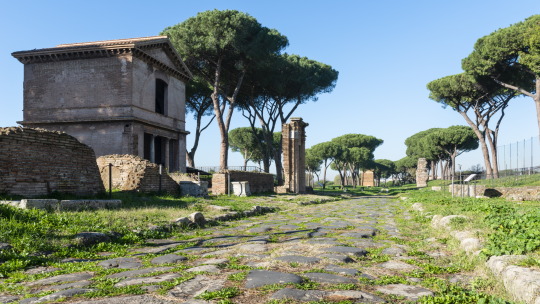
Antigua Via Latina / The ancient Via Latina
In the middle of the Roman periphery, between the modern Via Appia and Via Tuscolana, a section of the 3rd mile of the ancient Via Latina is preserved in perfect condition.
It has ancient origins: the natural route, already followed in prehistoric times, was used by the Etruscans to colonise Campania in the 8th-6th centuries BC.
Definitely laid out by the Romans around the IV-III centuries B.C., it connected Rome with Capua, maintaining its importance throughout Antiquity. In fact, even in the Middle Ages, it was preferred as an access road to Naples because of its better preservation compared to the Appian Way and the presence of a number of Christian places of worship along the route..
Entering the Archaeological Park of the Tombs of the Via Latina, it is now possible to walk along a section of the original paving of the street. With a pleasant walk you can admire the rich tombs dating back to the I-II century A.D. that overlooked the route, which still have perfectly preserved polychrome decorations on the façades and inside: vaults covered with painted plaster and stucco, walls frescoed with funerary scenes and rich mosaic floors are still substantially intact in their original context.
From the street it is also possible to reach the Basilica of S. Stefano, a rare example of an early Christian building erected under the pontificate of Leo the Great in the middle of the 5th century.
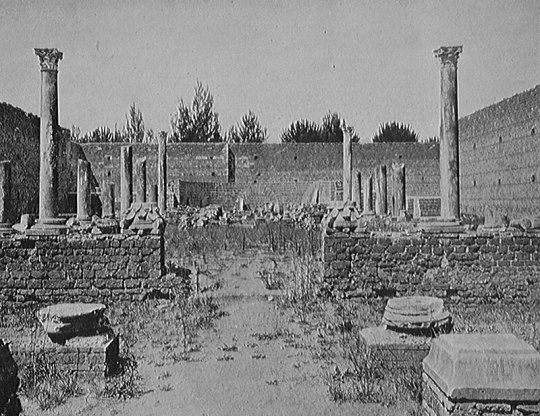
Santo Stefano en Vía Latina, restos parcialmente reconstruidos, 1911.
Santo Stefano in Via Latina, partially reconstructed remains, 1911.
The Archaeological Park of the Tombs of the Via Latina was created in 1879 following the acquisition by the State of a vast area in which important remains from Roman times had been discovered.
BARBERINI TOMB
The so-called Barberini Sepulchre, or Sepulchre of the Corneli. The funerary monument, dating from the 2nd century AD, consists of two above-ground floors and a hypogeum in an excellent state of preservation. The upper floor is covered by a ribbed vault completely covered with plaster painted with a red background and stucco elements. Groups of figures, winged victories on chariots, love affairs, birds, marine animals, mythological themes and architectural backgrounds can be recognised.
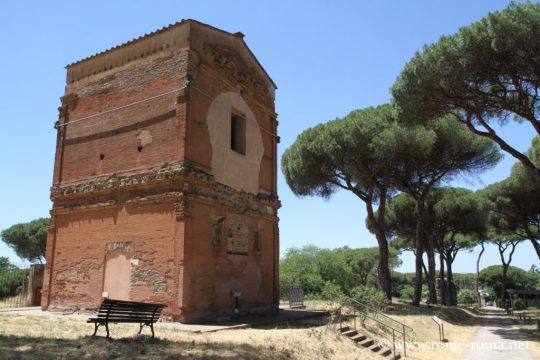
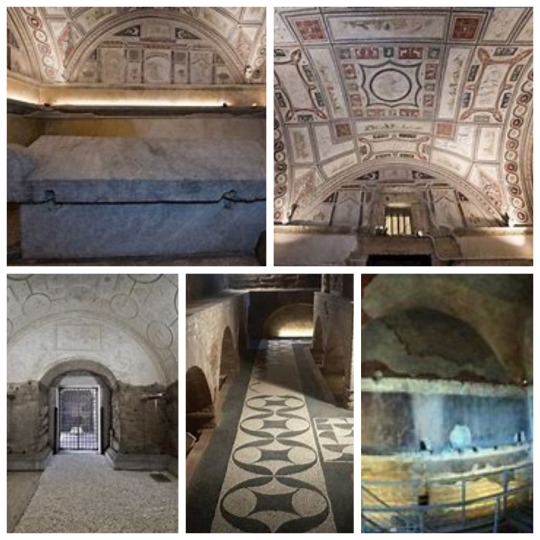
Sepulcro Barberini y su interior / Barberini Tomb and its interior
TOMB OF THE VALERI
The Tomb of the Valeri. The richly decorated underground rooms dating from the mid-2nd century AD are preserved, while the elevation is a hypothetical reconstruction dating from the mid-19th century. An elaborate white stucco covering, articulated in 35 medallions and panels, adorns the lunettes and the barrel vault of the underground room. The medallions depict Dionysian themes, female figures and sea animals, while in the central tondo there is a delicate-veiled figure on the back of a griffin, representing the deceased being carried to the afterlife.
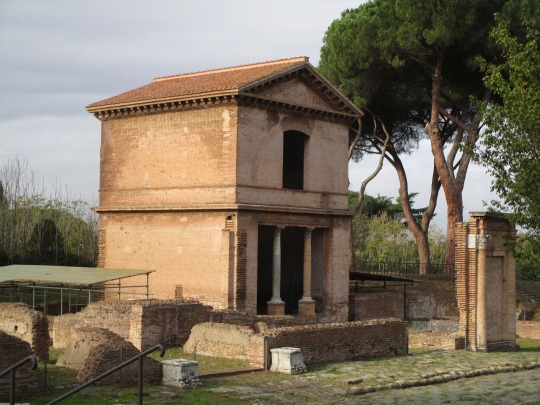
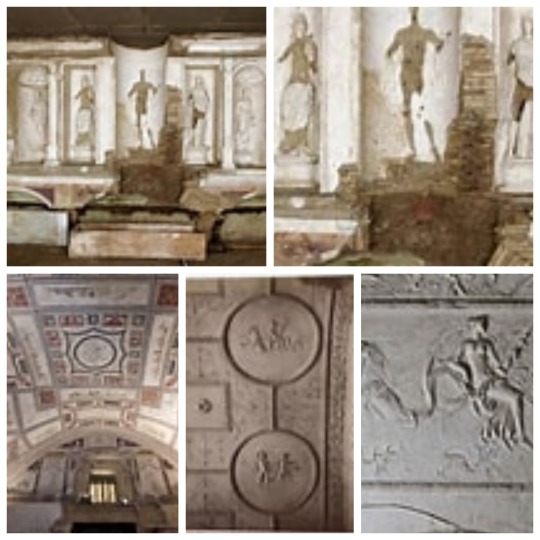
Tumba de los Valeri, exterior e interior / Tomb of the Valeri, exterior and interior
THE TOMB OF THE PANCRATII
The Tomb of the Pancratii. Much of the visible structure is a modern construction that protects the monument below by resting on the original 1st-2nd century AD walls, about a metre high. Upon entering the tomb, one can admire the beautifully decorated underground rooms, with mosaics on the floors and vaults and walls frescoed in bright colours and stucco in an excellent state of preservation. They depict mythological scenes, natural and architectural landscapes, images of women and animals. In the centre of one of the underground chambers is a large sarcophagus for two Greek marble depositions.
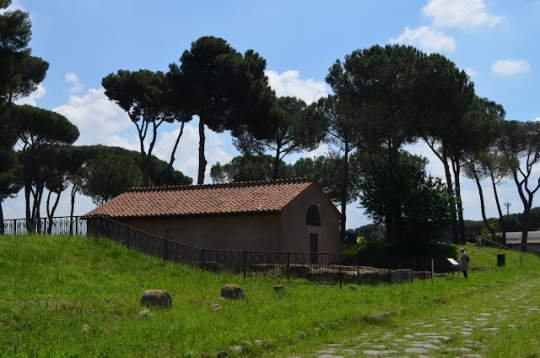
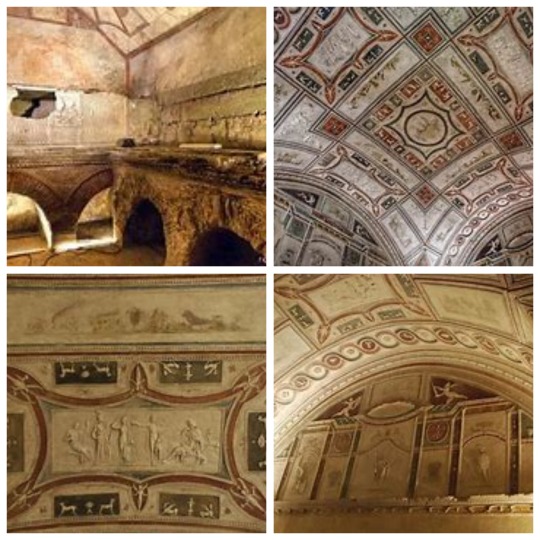
Sepulcro de los Pancracios, exterior e interior / Tomb of the Pancracios, exterior and interior
84 notes
·
View notes
Text

Rhinestone sunglasses rahffle for disabled mom Nara and her kiddos! Dough-nate at gofundme.com/disablednara to enter, every $5 is an entry!
send in your receipts to @StonedStonerStoning you have until Friday August 16 at 11:59 pm CDT! @StonedStonerStoning has told me that she can stone a pair of sunglasses you already have (for example if you have prescription sunglasses!), or you can alternatively have a custom lighter cover! Any color rhinestones on any shape of sunglasses! Nara has become one of my best friends! We are only one year apart in age, and we really get each other (especially because of overlapping symptoms). Nara’s kids are the cutest ever and they are obsessed with @FriedChickenDoglet ! Please support Nara even if you are not entering the rahffle! Everyone there needs consistent support for survival, displacement, medicine, clean food/ water! We have all noticed a sharp decline in support this week across all the GFM’s (I’m guessing because of the DNC coming up! Do not forget to build consistent support into your weekly budget!)! [Image Description: Sky is modeling @StonedStonerStoning rectangular frames sunglasses with lavender lenses + arms. The front is stoned on top with lavender and on the bottom with neon pink rhinestones, both colors of rhinestones have an iridescent shine. Sky has paired the sunglasses with a V neck zip front Rebirth Garments crop top in sheer neon pink, neon pink iridescent snake print with lavender trims. Xey are wearing lavender lipstick and geometric @NinkaPop_ earrings to top off the look. Right now Sky has brown short curly hair on top and shorter sides with long sideburns. Behind Sky is a hot pink disco ball and a circular acrylic on birchwood tondo @MichMillerPrint painting called “shiny things are for you too” that is reminiscent of a warped disco ball in pinks, blues, oranges and greens, overlapping grids and stripes. The walls are pastel pink and there are queercrip love symbol stickers on top of the photograph with some sporty 90’s font in mint text that reads : gofundme.com/disablednara sunglasses rahffle for Nara There is a pink and white QR code in the top right corner that goes to the link!]
#disabilityjustice#gaza genocide#gaza#free gaza#radicallyvisible#queerfashion#rhinestones#sunglassfashion#sunglasses#go fund me#go fund them
25 notes
·
View notes
Text

MWW Artwork of the Day (11/27/24) Early Imperial Period (Roman, 27 BCE-117 CE) Portrait of Terentius Neo and his Wife (c. 45-79 CE) Fresco from their house, Region VII, Pompeii Museo Archeologico Nazionale, Naples
In Greece and Rome, wall painting was not considered as high art. The most prestigious form of art besides sculpture was panel painting, i.e. tempera or encaustic painting on wooden panels. Unfortunately, since wood is a perishable material, only a very few examples of such paintings have survived, namely the Severan Tondo from c. 200 CE, a very routine official portrait from some provincial government office, and the well-known Fayum mummy portraits, all from Roman Egypt, and almost certainly not of the highest contemporary quality.
4 notes
·
View notes
Text
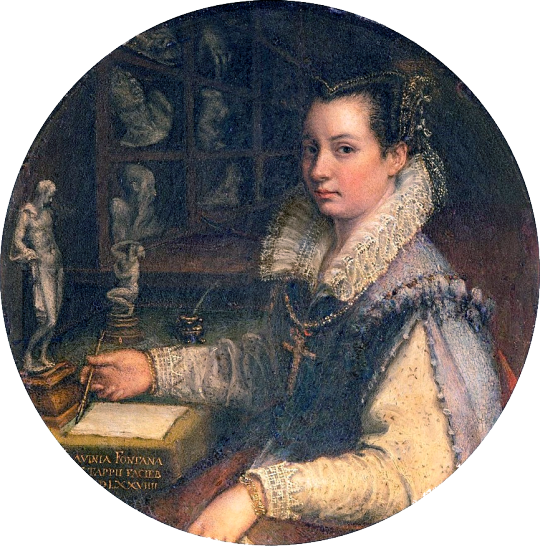
Self-Portrait in a Tondo, Lavinia Fontana, 1579
#art#art history#Lavinia Fontana#female artists#portrait#portrait painting#self-portrait#Mannerism#Mannerist art#Italian Mannerism#Italian art#Cinquecento#16th century art#oil on copper#tondo#Uffizi#Uffizi Gallery#Galleria degli Uffizi
138 notes
·
View notes
Text
COLOSSAL
Shyama Golden’s Monstrous Alter-Ego Transfigures in a Surreal Mythological Narrative
JUNE 14, 2024
GRACE EBERT

“Daydream of a Nocturne” (2023), oil on linen, 72 x 60 inches. All images © Shyama Golden
In Sri Lankan folklore, yakkas are demonic tricksters, and in the paintings of Shyama Golden, they’re alter egos. The Los Angeles-based artist presents a new body of work this month at Harper’s Chelsea that uses these mythological creatures to shatter the false binary of good and evil.
Like earlier series, In My Mind, Out My Mind roots in narrative. “Daydream of a Nocturne” launches the uncanny storyline with a self-portrait of the artist seated in a cemetery next to a monstrous twin, rendered in unsettling washes of blues and greens. Subsequent works glimpse the artist traversing a meadow with one of her signature anthropomorphic trees on the horizon, before she appears peeking from the belly of a masked creature in “The Double.”
Golden’s journey is psychological as she attempts to greet and embrace her inner demons before emerging anew. Each portrait witnesses the next step in her metamorphosis before she slithers from a tree in her human likeness in the bizarrely beautiful “Blood Orange Moon.” Set in the concrete-walled Los Angeles River, the artist echoes the symbiotic and parallel transformations of psyche and environment.
In My Mind, Out My Mind is on view through June 22 in New York. If you’re in London, you can see one of Golden’s paintings at PM/AM through July 15.

“Paradisification” (2023), oil on linen, 30 x 36 inches

“Restricted Area” (2024), oil on wood, 48 inches tondo

“The Double” (2024), oil on linen, 30x 36 inches

“Close to Home” (2024), oil on linen, 60 x 72 inches

“Afterbirth” (2024), oil on linen, 30 x 36 inches

“Blood Orange Moon” (2024), oil on linen, 60 x 72 inches
© Shyama Golden
COLOSSAL
#©️Shyama Golden #COLOSSAL
#original art #artist painter
#art #xpuigc
10 notes
·
View notes
Text



Gemma's new project, with husband Sam, Tondo has been launched!
@tondo_band is formed of experimental guitarist/visual artist @gemma_s_thompson (Savages) and drummer @sam.a.sherry (A Dead Forest Index), now based in Te Whanganui-a-Tara/Wellington, Aotearoa, NZ. Their music is inspired by concepts of visual scores/mark-making; expanding into textural collages of sound. (tondo, n. a circular painting). portrait photo by @amiorenati drawing by Gemma Thompson
4 notes
·
View notes
Text
I decided to make a That's Not My Neighbor original character. Her name is Tondo Bautista, also known as Miss Tondo.
This is her description spuds <3
Full Name: Tondo Bautista
Age: 25 years old
Occupation: Artist
Lives on F04-04
ID Number: 095675173248
Expiration date: 19/68
Entry Request:
"I come from my job as an artist."
"I went to my father's house to visit him."
Appearance:
-Rectangle and circle eyeglasses
-Has blush on cheeks
-Small lips
-ALWAYS wears an apron
Bonus stuff about appearance:
-Paint all over clothes
-Messy hair
-Has acne
-Chubby
8 notes
·
View notes
Note
You favorite little fact about manila by night
—Cider

haiii thank u so much for asking about manila by night<3
My favorite fact about this entire thing is that each character and dynamic represents a cultural, political, traditional, or religious aspect about Filipino culture in the modern era.
(More about it below)
Since the chronicle takes place specifically in late 2016-early 2017 where crime rate and police violence spiked in 2016, I thought that perhaps I could make a story about corruption like that.
Politicians are corrupt, full stop—but it’s even made worse in the Philippines due to mass manipulation. The prince of Metro Manila (who wants to govern the entire region of Manila, and perhaps even other regions), Prince Alejandra de Silva, is a straight up personification of these politicians. She’s absolutely them. She is a manipulative person, even going so far as to ghoul the head of the Manila Police Department for her own gain, causing her to kill humans and kindred alike because she simply can. If her rule is challenged, she lets her goons take care of it. She has been in Manila since 1972 as the Prince after usurping the last one, diablerizing him due to his weakness, and painting herself as the ‘hero’ after pitting the last prince and the Sabbat against each other in brutal fashion.
Alejandra is all things a Filipino politician. She kills because she knows she’s untouchable. Her reign is secured. I don’t say it to my players, but Alejandra manipulates the coterie by playing as someone they NEED. She’s the mentor of the Toreador, the guiding light of the Brujah, the welcoming godmother to the Banu Haqim in the coterie. Alejandra is manipulative and conniving.
Across from Alejandra is David Ramos, the Baron of Tondo—one of Manila’s poorest district. David is a mere neonate, an infant compared to her. While Alejandra is manipulative and a supreme force, David is the one to bring the giant down albeit, it’s taking a little slowly. Yes, David is a Brujah and yes, he’s not afraid to Camarilla ass—the problem is that Alejandra has everything in Manila under her hand.
David is a mere speck compared to her.
He represents the modern people in the Philippines, growing more and more conscious of the world and the powers at play but the thing is—as much as David is unafraid of death and Prince de Silva’s wrathful hand—he’s afraid of losing what he loves. The people he loves. The Anarch kindred of Tondo and surrounding districts could easily be overpowered by the Camarilla in Manila that greatly outnumber them.
Of course, I could go on and on about the political message these characters represent but that would turn into a book unfortunately
( a little fun fact: Prince de Silva made herself prince on the exact same year the Philippines’ most brutal president was voted in: 1972! )
#DAVID IS NAMED AFTER THE DAVID AND GOLIATH STORY BTW!!!!!!!!!#oc: prince de silva#oc: david ramos#<- they also represent a mother and child abusive relationship#marquis asks#manila by night#vtm#vampire the masquerade#vtm chronicle#ttrpg#ventrue#brujah
2 notes
·
View notes
Text
The Virgin and Child with Saint John and an Angel, about 1490, Sandro Botticelli
La Virgen y el Niño con San Juan y un ángel, hacia 1490, Sandro Botticelli

Madonna col Bambino, San Giovanni e un angelo, 1490 circa, Sandro Botticelli
(English / Español / Italiano)
Workshop of Sandro Botticelli, 1490 Tempera on wood, 84.5 x 84.5 cm
Restored in 2018–19, this is one of the more significant paintings of the Virgin Mary to survive from the workshop of the Florentine Renaissance artist Sandro Botticelli. The exposed breast with which the Virgin Mary is nourishing her infant son, the Christ Child, is central to the design of the painting. The young Saint John the Baptist on the left and the angel on the right are slightly bent forward as if to fit into the circular format. This tondo was among the very first early Italian paintings to enter the National Gallery’s collection, and its acquisition in 1855 coincided with the rise in popularity of Botticelli. Numerous artists came to see it, producing copies of it, and studying its tempera technique (tempera is paint made using egg yolk as a medium).At some point it was displayed next to works by Raphael. The painting survives with its original frame.
---------------------------------------------------------------------------
Taller de Sandro Botticelli, 1490 Temple sobre madera, 84,5 x 84,5 cm
Restaurada en 2018-19, esta es una de las pinturas más significativas de la Virgen María que sobreviven del taller del artista renacentista florentino Sandro Botticelli. El pecho expuesto con el que la Virgen María alimenta a su hijo, el Niño Jesús, es fundamental para el diseño de la pintura. El joven San Juan Bautista, a la izquierda, y el ángel, a la derecha, están ligeramente inclinados hacia delante, como para encajar en el formato circular. Este tondo fue uno de los primeros cuadros italianos en entrar en la colección de la National Gallery, y su adquisición en 1855 coincidió con el auge de la popularidad de Botticelli. Numerosos artistas acudieron a contemplarlo, realizaron copias y estudiaron su técnica al temple (el temple es una pintura hecha con yema de huevo como medio); en algún momento se expuso junto a obras de Rafael. El cuadro se conserva con su marco original.
------------------------------------------------------------------------------
Bottega di Sandro Botticelli, 1490 Tempera su tavola, 84,5 x 84,5 cm
Restaurato nel 2018-19, questo è uno dei più significativi dipinti della Vergine Maria sopravvissuti dalla bottega dell'artista rinascimentale fiorentino Sandro Botticelli. Il seno esposto con cui la Vergine Maria nutre il figlio neonato, il Bambino Gesù, è al centro del disegno del dipinto. Il giovane San Giovanni Battista a sinistra e l'angelo a destra sono leggermente piegati in avanti come per adattarsi al formato circolare. Questo tondo è stato uno dei primi dipinti italiani ad entrare nella collezione della National Gallery e la sua acquisizione nel 1855 coincise con l'aumento della popolarità di Botticelli. Numerosi artisti vennero a vederlo, producendo copie e studiando la sua tecnica a tempera (la tempera è una pittura realizzata con il tuorlo d'uovo). A un certo punto fu esposto accanto a opere di Raffaello. Il dipinto sopravvive con la sua cornice originale.
#painting#pittura#renacimiento#renaissance#rinascimento#il quattrocento#15th century#s.XV#sandro botticelli
4 notes
·
View notes